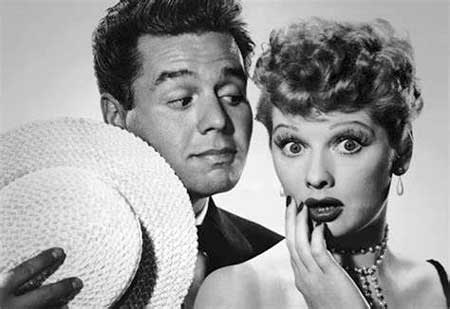Film (2022)
Documentary
Directed by Amy Poehler

Photo: Courtesy of CBS
The endless clips from I Love Lucy are worth the price of admission to this thoughtful paean to the comic duo who made their biggest joint success in the 1950s, but there is a lot more to savor here. This chronological documentary, directed by comedian Amy Poehler and hosted and narrated by Lucy’s and Desi’s daughter Luci, covers a tremendous amount of ground. Tales from Lucy’s modest childhood in Jamestown, NY describe the determined impetus for her later success. That early success is documented vividly and fully with a series of accounts of her work in theater in NY and then in Hollywood.
While describing Lucy as not particularly beautiful or talented early on in her career, the film creates a sense of Lucy’s self-creation, her capacity to go from showgirl to model and then to begin to develop her comic repertoire and reputation. The sense of her determination to make it one way or another and her courage to risk things actresses had not tried, come through very clearly.
Desi Arnaz, the child of a well to do Cuban family which lost all its wealth in the revolution of 1933, talks of his poverty and desperation arriving on the shores of the United States. Clearly, his early path was an evolution as well. Not particularly successful as a musician in Latin jazz bands, he happened upon the idea of developing a reputation as a showman who played the conga drum. That brought him attention and success and eventually led him as well to Hollywood.
Both Lucy and Desi had signficant careers before they met, but when they came together in the 1940s, they fueled a partnership that made television history in the 1950s.
Of course, their greatest visible success was I Love Lucy in which Lucille got to stretch her comic wings and played off the trio of Desi, and Vivian Vance and William Frawley as Ethel and Fred Mertz. In addition to the hilarity of the scenes collected here are tidbits of little-known facts about the show. Among those was the revelation that Vance and Frawley did not get on at all well; Frawley was 22 years older than Vance and she was irritated to be cast as the wife of such an old man; but Frawley was equally upset that Vance was upset about that.
The show flourished and Desi and Lucy formed a production company, Desilu Productions, that expanded its business, largely under Desi’s business acumen. But despite Desi’s considerable talents as producer and studio executive, he drank heavily, he and Lucy fought, and they eventually were divorced.
At a certain point, Desi sold his part of the company to Lucy and in the 1960s she developed a whole series of projects including The Lucy Show which had considerable success. She went on to marry Garry Morton and Desi went on to marry Edith Hirsch, with whom each of them remained for 20+ years, seemingly quite happy.
But it was Lucy who continued her business and acting success while Desi receded into the shadows. Touchingly, Luci gives an account of Desi’s and Lucy’s last encounters – they remained friendly though married to other people – giving a clear sense of their lifelong devotion to one another despite the sadness of their separation.
A clear message that rings through interviews with Carol Burnett and Bette Midler, among others, is what an inspiration as a comic actress Lucy was. Unafraid to dress or act in any way that might get a laugh, she was an innovator. Some clips of Ball and Burnett onstage together give the sense of that; Ball was 22 years older than Burnett, but clearly shared the wild fun in the act of passing on the mantle.
Amy Poehler manages deftly to convey the sense of hard work and the courage to break through old constraints that characterized Lucille Ball’s genius. And, without shrinking from some of the tough aspects of Lucy’s and Desi’s relationship, the film gives a sense of that brilliant partnership while it lasted, and the echoes of mutual appreciation that remained when it no longer did.
– BADMan (aka Charles Munitz)
Leave a Reply